Can you self study for JLPT? In this article, we will outline the key features of a good self-study program for the JLPT and tell you whether or not it is the right option for you.
Japanese Language Proficiency Test aka JLPT is the ultimate course for non-Japanese speakers to master the Japanese language to be able to speak and write Japanese fluently.
JLPT consists of 5 levels, each level determining its difficulty based on the subjects covered throughout.
As someone who has self-studied for all JLPT exams, I can assure you that it doesn’t seem complicated like how some people portray it to be.

However, you must put in your utmost efforts and dedicate several months to educating yourself by compromising most of your leisure activities.
In this blog, I’ve discussed how you can self-study for JLPT including the study plan, how long each level takes to complete, tips for self-studying as well as how to apply for JLPT exams. Check them out below!
Page Contents
Can You Self Study For JLPT?
Self-studying for JLPT might seem like a daunting task but it’s possible to pull it off with adequate time and by following the ideal materials for the exams online.
By preparing a well-defined study schedule you can self-study all the levels of JLPT and sit for the exams without a hassle.
How Can You Self-Study For JLPT?
When I signed up for the task to self-study Japanese on my own I thought I was going to utterly fail because Japanese is one of the most intricate languages out there not to mention its complex lettering system that involves over 2000 kanji letters as well as hiragana and katakana.
Although learning the Japanese vocabulary was the easiest part for me due to being an avid anime geek, on the other hand, understanding grammar became an uphill battle.
Despite having ups and downs when learning Japanese, I was successfully able to pass all the JLPT tests with a precise study plan.

Each level on the JLPT course defines the elements of learning Japanese based on its difficulty. The easiest and the beginner levels of JLPT are N5 and N4 which place emphasis on the fundamentals of the Japanese language such as reading kanji letters and basically any content learned in a classroom.
JLPT N3 is the interconnecting level that enjoins levels N5 & N4 with N2 & N1. Meanwhile, N2 & N1 focus on the broader and advanced spectrum of the Japanese language including speaking, grammar, and writing fluently.
With my pristine study plan for JLPT, you’ll come across the duration you should spend on self-studying each level and what you should achieve within the time frame.
Self Study Plan For JLPT Levels N5-N1
Here’s the self-study plan for each JLPT level. Be mindful that only by putting your maximum effort into studying the contents under each level you’ll be able to master the Japanese language and sit for the exams confidently.
My study plan was 10 hours per week and I followed this schedule for all the levels.
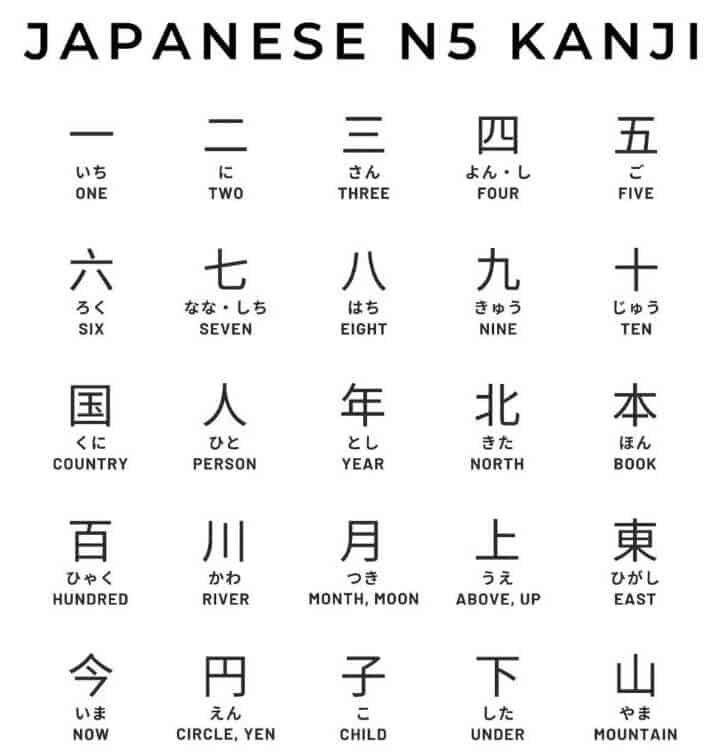
- Self Studying For JLPT Level N5 (3 months)
Since JLPT Level N5 is the beginner’s level you ought to spend at least 2-3 months learning over 100 kanji letters and not less than 700 Japanese vocabulary words.
This level ensures the students are familiar with numbers, days of the week, months of the year, day-to-day nouns and verbs, learning how to call family members, etc.
1st week – Kanji reading (100 letters)
2nd week – Learning days of the week and months of the year
3rd week – Learning how to address family members
4th week – Nouns and verbs
5th week – Japanese vocabulary (700 words)
6th week – Vocabulary and grammar (Tenses, participles, etc)
7th to 8th week – Verb conjugating
9th to 10th week – Reading
11th to 12th week – Writing
- Self-Studying For JLPT Level N4 (5 months)
JLPT Level N4 is much more advanced than N5 as this level emphasizes reading and comprehending passages, the ability to follow and understand everyday Japanese conversations to an extent, and writing short passages.
Once you’ve undertaken the JLPT Level N4, you should be skilled in reading 300 kanji letters and cognizant of 1500 Japanese vocabulary at the end of the course.
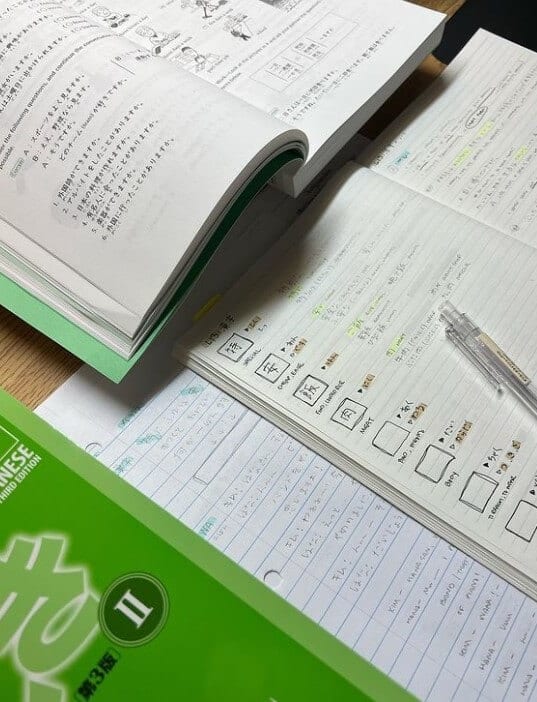
1st to 3rd week – Kanji reading (300 letters)
4th to 8th week – Vocabulary (1500 words)
9th to 12th week – Text grammar
13th to 16th week – Sentential grammar
17th to 20th week – Comprehension (short and mid-length passages)
- Self-Studying For JLPT Level N3 (8 months)
JLPT Level N3 is the intermediate level that tests your capacity to comprehend the Japanese language in instances such as being able to read advanced materials like newspapers and grasp some or all the details of the material.
You should also be capable of catching up with regular conversations Japanese speakers have every day and understanding the scenario of it as well as writing coherent sentences.
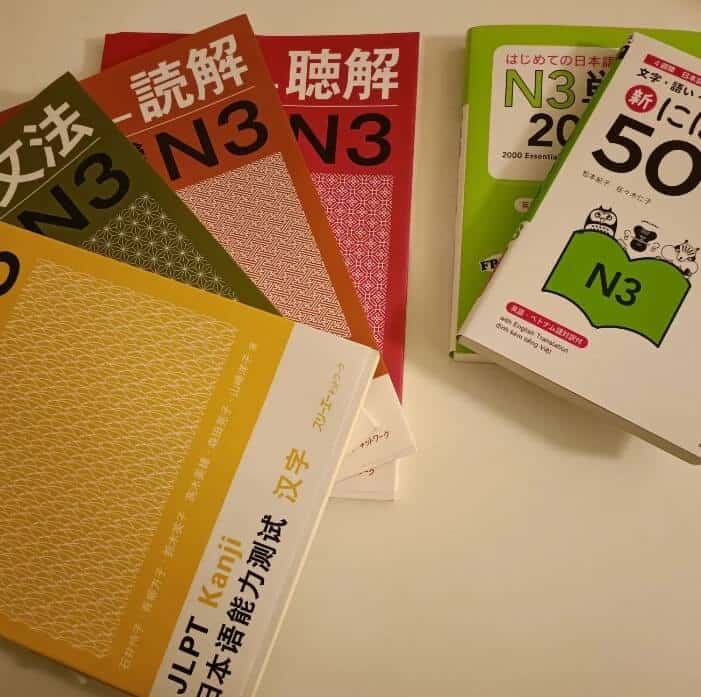
Listening plays a huge role in Level N3 exams compared to the prior levels because I was tested much more strictly in this arena.
You ought to be familiar with grammatical usages and write mid-length sentences. This level also covers 650 kanji and almost 3700 Japanese vocabulary words that should be on the tip of your fingers.
1st to 3rd week – Kanji reading (650 kanji)
4th to 9th week – Japanese vocabulary (3700 words)
10th to 15th week – Advanced reading (newspapers)
16th to 21st week – Grammar (text and sentential)
22nd to 25th week – Forming sentences (mid-length)
26th to 29th week – Comprehension (medium-length passages)
30th to 32nd week – Writing coherent passages
- Self-Studying For JLPT Level N2 (10 months)
Level N2 is the upper-intermediate class and to be able to sit for the N2 exams you must at least be a near professional in the Japanese language.
This section covers the everyday scenarios of the Japanese language in a wider spectrum like reading newspapers, articles, and advanced books and understanding what the writer conveys.
Listening is crucial at N2 hence you should comprehend advanced conversations in Japanese entertainment content and catch up with average-speed Japanese conversations.
Once studying the N2 level in-depth, you should be proficient with at least 1000 kanji and 6000 Japanese vocabulary words.
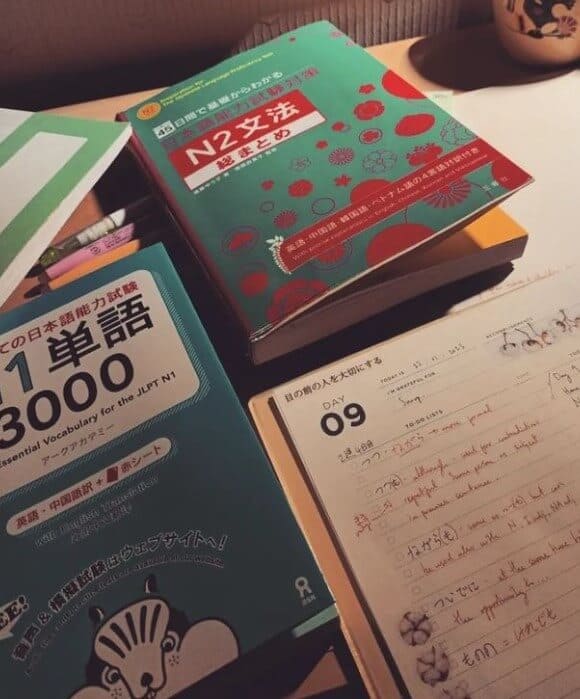
1st month – Kanji reading (1000 kanji)
2nd month – Vocabulary (6000 words)
3rd to 4th month – Advanced reading (newspapers, magazines, articles, etc)
5th to 8th month – Writing coherent passages and answering intermediate to advanced questions.
9th to 10th month – Comprehending professional speech
If you continue with the 10-hour study schedule per week then you can master Level N2 between 9-10 months.
- Self-Studying For JLPT Level N1 (15 months)
This is the final and most advanced level in JLPT. Everything you’ve learned from the previous levels should be profoundly ingrained into your brain.
I had to learn over 10,000 Japanese vocabulary and 2000 kanji letters to master the N1 level.
Since this level covers a broader range of daily Japanese scenarios you must learn how to read and write complex passages and comprehend advanced oral materials like news, Japanese movies, documentaries, etc.
Grammar, conjugation, paraphrasing, advanced synonyms and antonyms, writing essays, etc are all part of the N1 level. This seemed to be the most difficult level for me particularly when it came to writing passages.
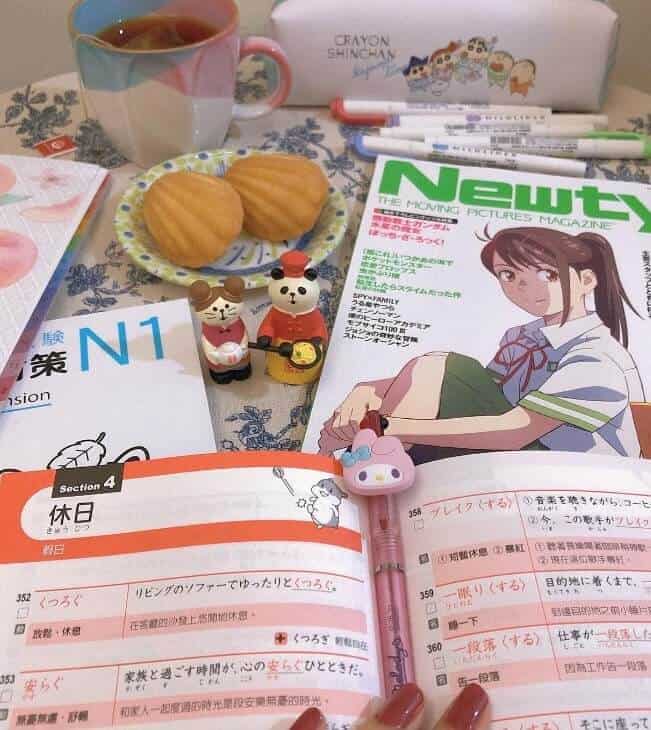
1st to 2nd month – Kanji reading (2000 letters)
3rd to 5th month – Vocabulary (10000 words)
6th to 8th month – Advanced reading
9th to 11th month – Writing advanced essays, passages, etc
12th 15th month – Understanding professional speech from Japanese shows, news, movies, etc
After self-studying N1 for an entire year I still revised for 3 months to be skilled with the contents. Following a 10-hour study schedule weekly will help you sit for the Level N1 exam within 13 or 15 months.
Tips For Self-Studying JLPT
If you’ve considered self-studying for JLPT, then you have chosen the toughest and most time-consuming learning methods.
However, don’t let that discourage you from self-learning Japanese because if you have the dedication and will for it, you can pull it off with a great measure.
And to make the task convenient for you I’ve brought a few tips that’ll benefit you on your Japanese self-studying quest.
Follow Online Courses And Video Materials – With the help of the internet we’re all under one umbrella hence you can come across countless online courses, quizzes, videos, and listening materials uploaded by competent Japanese scholars.
All of this content helped me loads when it came to learning kanji letters at the beginning.
These lessons also include verb conjugations and tenses which helped me to improve my Japanese grammar gradually.
By following Japanese courses online you’re also exposed to a wide array of content hence you can grasp innovative aspects and elements of the Japanese language.
Reading Japanese Textbooks For Learners – There are numerous Japanese textbooks for learners. Apart from the official JLPT textbooks, I’d recommend a few others that would assist in broadening your knowledge.

Textbooks such as Summary of Japanese, Try! Japanese Language Revised Edition and Shin Nihongo 500 questions were the holy grail for me when I took the JLPT tests.
These books don’t just come with reading passages but also with questions and quizzes that test your proficiency in the language at every level.
Watch Anime And Other Japanese Entertainment – Not a lot of people are going to tell you this but watching anime relentlessly did aid me in picking up essential and creative Japanese vocabulary.
If you’re already an anime geek then you know what I’m talking about. However, if you’re not interested in anime then it shouldn’t be much of a concern although it helps to a certain extent to catch up with the otaku vocabulary.
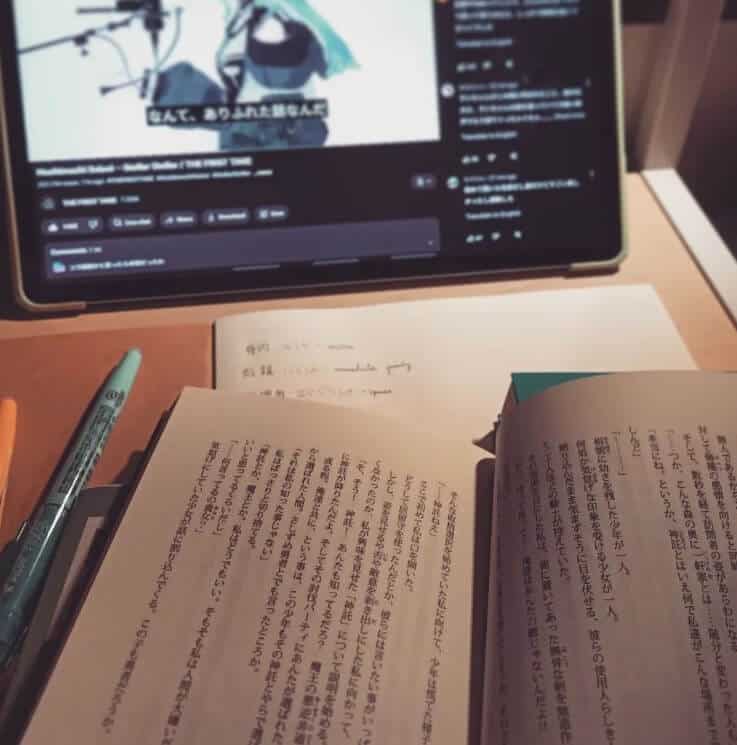
How To Apply For JLPT and When Can I Take The JLPT Test?
You can simply apply for JLPT tests online and you should know that JLPT tests are held only two times per year, specifically in July and December. You can only apply for the JLPT tests through the JLPT website.
In order to apply for JLPT tests you must create an account that qualifies you to register for the exam. You can create a JLPT account here.
After creating an account, you can register for the JLPT tests online. All you have to do is fill out the application, choose the application type, agree to the website’s privacy policy, choose the JLPT test level and pay for the test. The charges for tests can vary depending on the level and your location.
You can take the JLPT tests in Japan or at a certified local educational institute.
Click here if you’re taking the test in JapanClick here if you’re taking the test in a certified educational institute in another country.
Also Read:





